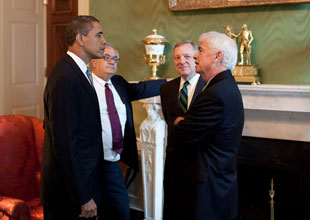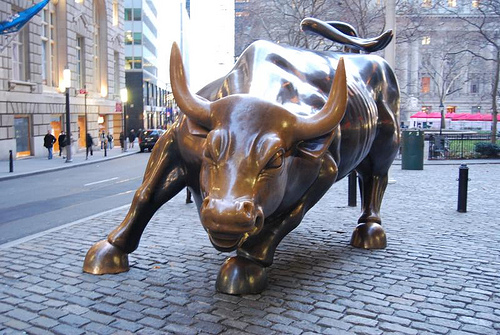If you’re Paul Krugman, then the answer to that question is, Yes. In his column today, the liberal economist essentially calls the Senate’s financial-reform talks a fakery and a sham, adding that the only thing weak financial reform would do “is create a false sense of security and a fig leaf for politicians opposed to any serious action—then fail in the clinch.”
The impetus for Krugman’s remarks is Sen. Chris Dodd’s plan (PDF) to create not an independent consumer protection agency—the kind the House passed and the Obama administration purportedly supports—but a Bureau of Financial Protection housed within the Treasury Department much like the Food and Drug Administration is housed within the Health and Human Services Department. Consumer advocates and experts say Dodd’s watered-down version of consumer protection raises numerous questions about the independence and efficacy of a Treasury-housed bureau, especially given the subpar records before the crisis of two other regulators within the Treasury—the Office of Thrift Supervision and the Office of the Comptroller of the Currency. And there’s also the problem of no apparent Republican support for Dodd’s compromise plan, too.
When it comes to consumer protection, Krugman argues, no reform would be better than what Dodd is proposing:
Some have argued that the job of protecting consumers can and should be done either by the Fed—or as in one compromise that at this point seems unlikely—by a unit within the Treasury Department. But remember, not that long ago Mr. Greenspan was Fed chairman and John Snow was Treasury secretary. Case closed. The only way consumers will be protected under future antiregulation administrations—and believe me, given the power of the financial lobby, there will be such administrations—is if there’s an agency whose whole reason for being is to police bank abuses.
In summary, then, it’s time to draw a line in the sand. No reform, coupled with a campaign to name and shame the people responsible, is better than a cosmetic reform that just covers up failure to act.
Now, while consumer protection is arguably the centerpiece of financial reform, there’s still the issue of regulating over-the-counter derivatives, monitoring and reining in banks that become too big and too interconnected to fail, and creating some kind of authority to unwind or “euthanize” institutions when they pose that kind of systemic threat. Which is to say, a watered-down consumer protection agency won’t kill the entire bill. But don’t be surprised to hear many more reform advocates joining Krugman’s line-in-the-sand camp.

















